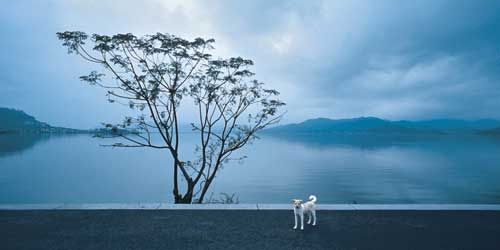Dongqian Lake
Surrounded by successive green mountains and beautiful scenery, there is a brilliant pearl glittering in southeast suburbs of Ningbo downtown, Dongqian Lake by name. It is harmoniously melted with the grace of West Lake and the verve of Taihu Lake, said Guo Moruo, a well-known Chinese litterateur.
Dongqian Lake, a typical natural lake, is the largest freshwater lake in Zhejiang province, which was dredged and renovated in several dynasties. Now it covers an area of 20 square kilometers and has a perimeter of 45 km with a length of 8.5 km from the north to the south and a width of 4.5 km from the west to the east. Its reservoir capacity reaches 33.9 million cubic meters, almost three times as much as that of the West Lake in Hangzhou.
Dongqian Lake possesses of beautiful ecology environment, with wide lake surface, and curved lake bank surrounded by mountains, with the verdant forest. It enjoys nice subtropical monsoon climate, gentle and moist in the whole year, with plentiful rainfall, and an average temperature of 15.4 C. The location of Dongqian Lake promotes the formation of a prime tourism market in the Yangtze River delta where Dongqian Lake Resort enjoys highly-developed economy,densely-inhabited population and conveniently-connected traffic. Not far from the resort is Ningbo, which witnessed high-paced economy, thus forming the central point in the tourism market of Eastern Zhejiang. Convenient traffic conditions enhance the development in this tourism market. With a ten-minute drive, people can get from Dongqian Lake to Ningbo downtown area or Lishe International Airport. After Hangzhou Bay Bridge was completed in 2008, the distance between Ningbo and shanghai has been dramatically shortened.

Trade culture. More than 2000 years ago, this very lake came to the people's view. During the Spring and Autumn Period (770-476 BC), a senior official in the kingdom of Yue, named Fan Li, once retreated in Crouching Ox Mountain beside Dongqian Lake, with the celebrated beauty XiShi. He made his living by trading and then became the richest man ever since, leaving a beautiful legend behind. During the modern times, with the opening of five treaty ports, many people emigrated aboard, and set up their own business there, and most of them become successful businessmen and are renowned for their patriotism
Buddha culture. In Dongqian Lake area, there are many famous temples. One is Tian Tong Temple, which was built more than 1,600 years ago. It is one of the five Buddhism temples, and attributes great influence upon Japan and many countries in Southeast Asia. Asoka Temple, one of the five Chinese Buddhism temples, has a history of more than 1,700 years. It is world famous for the Buddhism relics collected in the temple. Daci Buddhism temple at the foot of Fuqian Mountain was famous ever in the South Song period (1127 – 1279). It is said that there are more than 1,000 monks in its prime period. As a temple of more than 1,700 years, it obtains essential status in Buddhism interchange between China and Japan.



 Print
Print Mail
Mail
